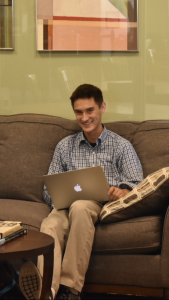Morgan Bramwell ‘21, Morgan Rees ‘21:
Stemming from an increase in stress, the use of technology, and a willingness from peers, cheating at EA has become a prevalent issue.
The school’s motto, “Esse Quam Videri,” translating to, “To be, rather than to seem to be,” has been a signature principle of the Episcopal Academy’s ethics policies. All students promise, as part our ethics policy, to keep our work free of plagiarism: the act of taking someone else’s work and passing it off as your own.
Thomas Goebeler, Ph.D., Upper School math teacher and Disciplinary Board member, summarizes the ethical responsibilities we are expected to abide by at EA, explaining, “We need to do a better job of representing the public face. We have Esse Quam Videri written everywhere, are we really being, rather than seeming to be? We need to show that doing the right thing is the EA way.”
EA is a “one to one” school. Students are each issued school laptops in a system that tracks submitted information to known published works and tracks their similarities. However, even with these precautionary measures, Leslie Trimble, Chair of the Disciplinary Board, says, “with technology, it is so much easier to cut and paste information into a document or a presentation that you are making.” Simply put, technology makes it easier to plagiarize.
Procrastination and poorly budgeted time also lead to increased plagiarism. Goebeler continues, “Every student at EA is busy. They all face time pressures, but not every student cheats. So the ones who do cannot use time as an excuse.”
Outside factors also contribute to students’ stress. Interim Head of Upper School Mike Letts states, “The main reasons are the pressures of parents, college, and peers.”
The Disciplinary Board deals with numerous cases of cheating or plagiarism differently depending on the severity of the offense.

Trimble adds, “We have been finding that we need to do different things for different kids in order for them to see the seriousness of plagiarism.” She continues, “But if we feel that someone is not getting why this is really a problem, a rupture in our community, we feel that other things like apologies to the people whose trust you have violated may be better for the individual.”
Kris Aldridge, IV Form Dean and a former member of the Disciplinary Board, explains the severity of academic dishonesty, saying, “We’re a school, we’re an educational institution and we’re here to help you learn and develop. So there are precious things at this school that are taken more seriously than academic dishonesty.”
She also explains what it means for a student to be suspended to do their academic dishonesty, saying, “Unfortunately, those students are often suspended and being suspended that we cannot bear to have you part of our immediate community for a day or two. It’s not a day off from school, or at least it shouldn’t be, it’s a message that we don’t want you to be part of our community for a couple days. We want you to sit and think of what you’ve done. Whether that has college ramifications is really a different question, but certainly, the committee takes those cases very seriously.”
Plagiarism affects students’ lives very differently depending on when they are caught or what they are caught doing. Aldridge, says,” Once you’ve done it once and you’ve gotten away with it it seems really easy to do again and all of the sudden you’re just frankly a cheater and one of your options is cheating and that cheating starts to apply to lots of areas of your life. And then it isn’t always restricted to academics.” Letts, in agreement, says, “You are viewed by this community as someone who cheats, and I hope that that has somewhat of an effect on you.” Letts also adds “Academic integrity is something [colleges] see as a window into your character, and so when they see that you cheated or have been found guilty of cheating, that’s a big deal, and something they often have a hard time looking past.”
EA, however, does not require students to report their disciplinary history to colleges.
Paloma Zozaya ‘18, states, “In order for kids to feel comfortable with cheating it means that other students have done it in the past and gotten away with it, it’s just a matter of whether or not the teachers will catch it and if they do, how strongly they’ll enforce academic honesty.” Zozaya later added, “Kids don’t see that actually doing the work is much easier than pretending that you did the work in the long run.” Charlotte Weisman ‘18, also says, “For me, it’s much easier to just go to my teacher and tell them I’m struggling rather than figure it out myself. It’s much less risky.”
“I worry about the kids that don’t cut the corners, and are honest and watch kids cheat, and get better grades than they do. And I think you guys should be policing some of this yourself because it just not okay. We expect honesty from our students” Letts concludes.